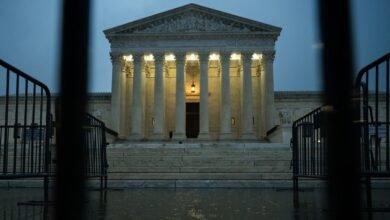
When Donald Trump first ran for president, he began to threaten that Amazon and Jeff Bezos would pay the price. “If I become president — oh, do they have problems. They’re going to have such problems,” he warned. Trump’s grievance with Amazon was centered on Bezos’s ownership of the Washington Post, a connection the president did nothing to disguise. He raged at what he called the “Amazon Washington Post,” claiming spuriously that it had avoided “internet taxes.” In 2018, Gabriel Sherman reported that Trump was “obsessed” with retribution against Bezos for the Post’s coverage.
“Every hour, we’re getting calls from reporters from the Washington Post asking ridiculous questions,” he ranted at one point, “And I will tell you: This is owned as a toy by Jeff Bezos, who controls Amazon. Amazon is getting away with murder, taxwise. He’s using the Washington Post for power.”
In 2019, Trump found his lever. Amazon was due to receive a $10 billion cloud-computing contract from the Pentagon. The Pentagon suddenly shifted course and denied Amazon the contract. A former speechwriter for Defense Secretary James Mattis reported that Trump had directed Mattis to “screw Amazon.”
This is the context in which the Post’s decision to spike its planned endorsement of Kamala Harris should be considered.
The Post’s argument is that it is adopting a policy of abstaining from endorsements in presidential races. I believe that policy is, in the abstract, correct. Endorsements in local races make a huge difference because readers have often paid little attention and need an authoritative recommendation. People who read newspapers like the Post don’t need suggestions like this. Endorsing national candidates merely creates the appearance of bias for little practical benefit. The paper can explain that its endorsement does not impact its news coverage, and that explanation is correct, but there’s no reason to force every journalist to rebut the appearance of partiality created by national endorsements.
That said, the process by which the Post arrived at this decision stinks to high heaven. The newspaper’s editorial board had planned and reportedly written its endorsement before management quashed it. The abstract journalistic reason to end national endorsements was knowable months and years in advance. The Post announced its decision at the last minute of a razor-thin campaign, in an atmosphere in which conventional wisdom (if not necessarily the polls) is increasingly treating Trump as the favorite.
The absence of a Post endorsement does not matter. What matters is the very live prospect that Bezos will continue leaning on the journalists in his employ to make their work less offensive to a president who has proven he is willing and able to take money out of Bezos’s pockets if he defies him.
Source link




